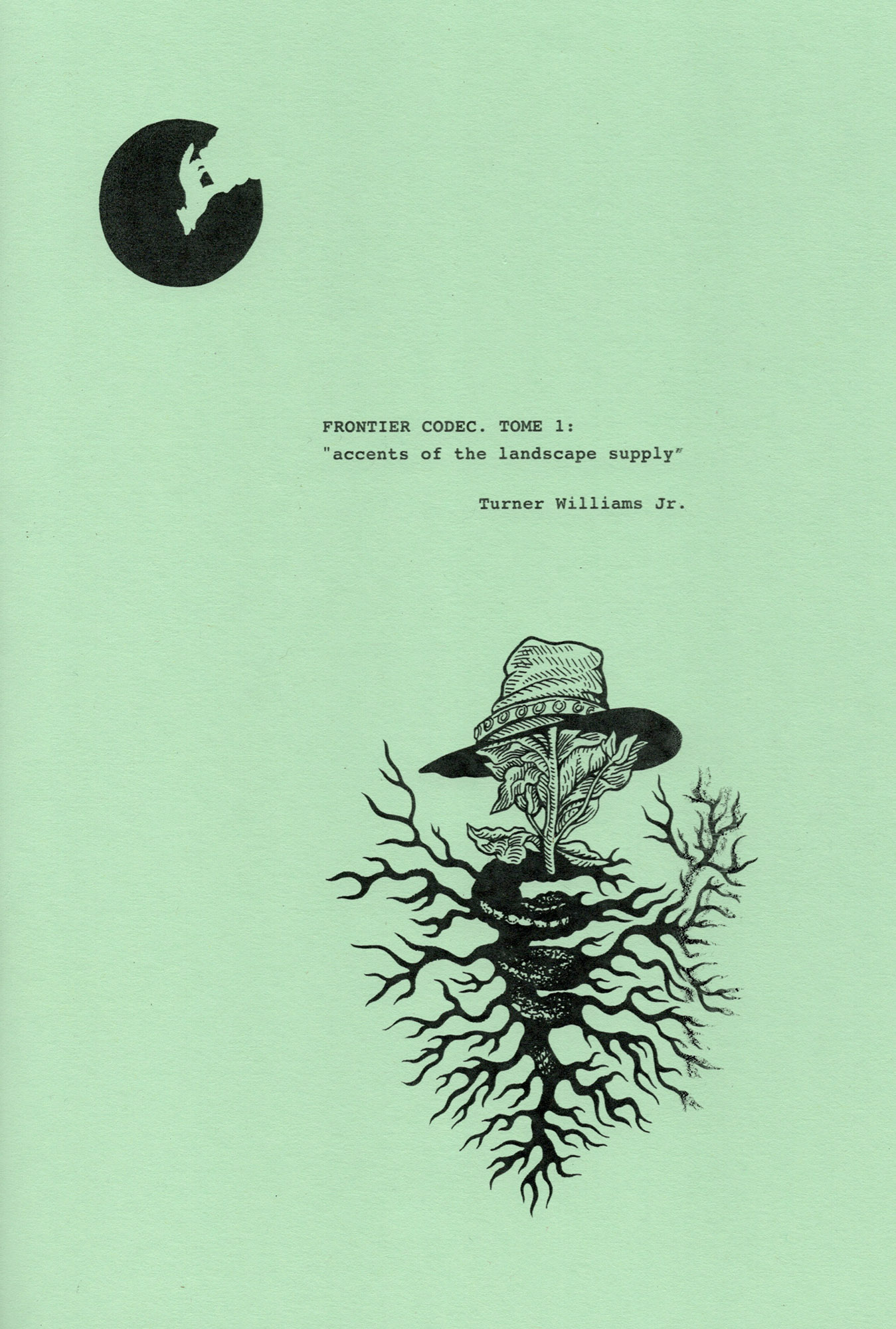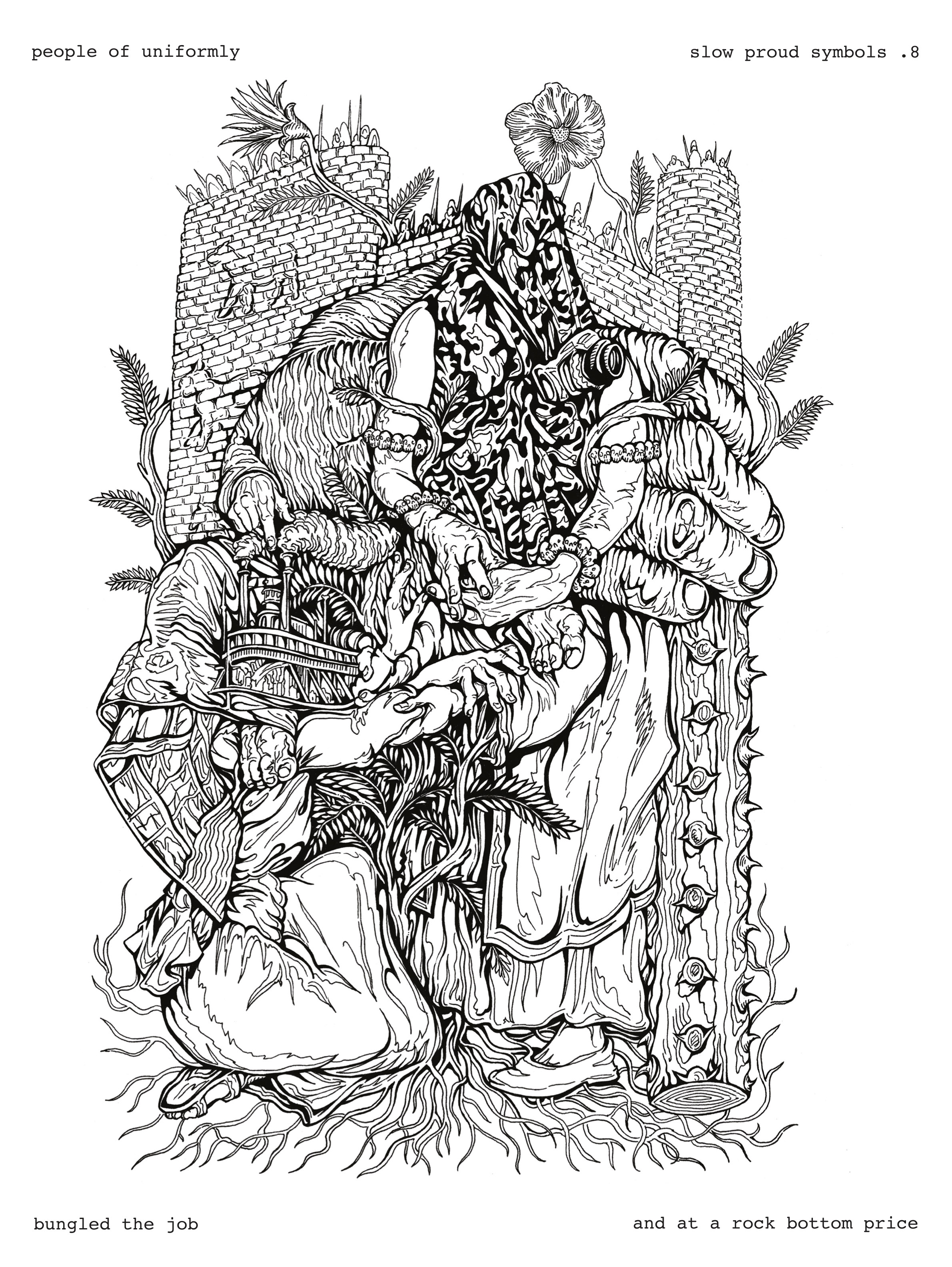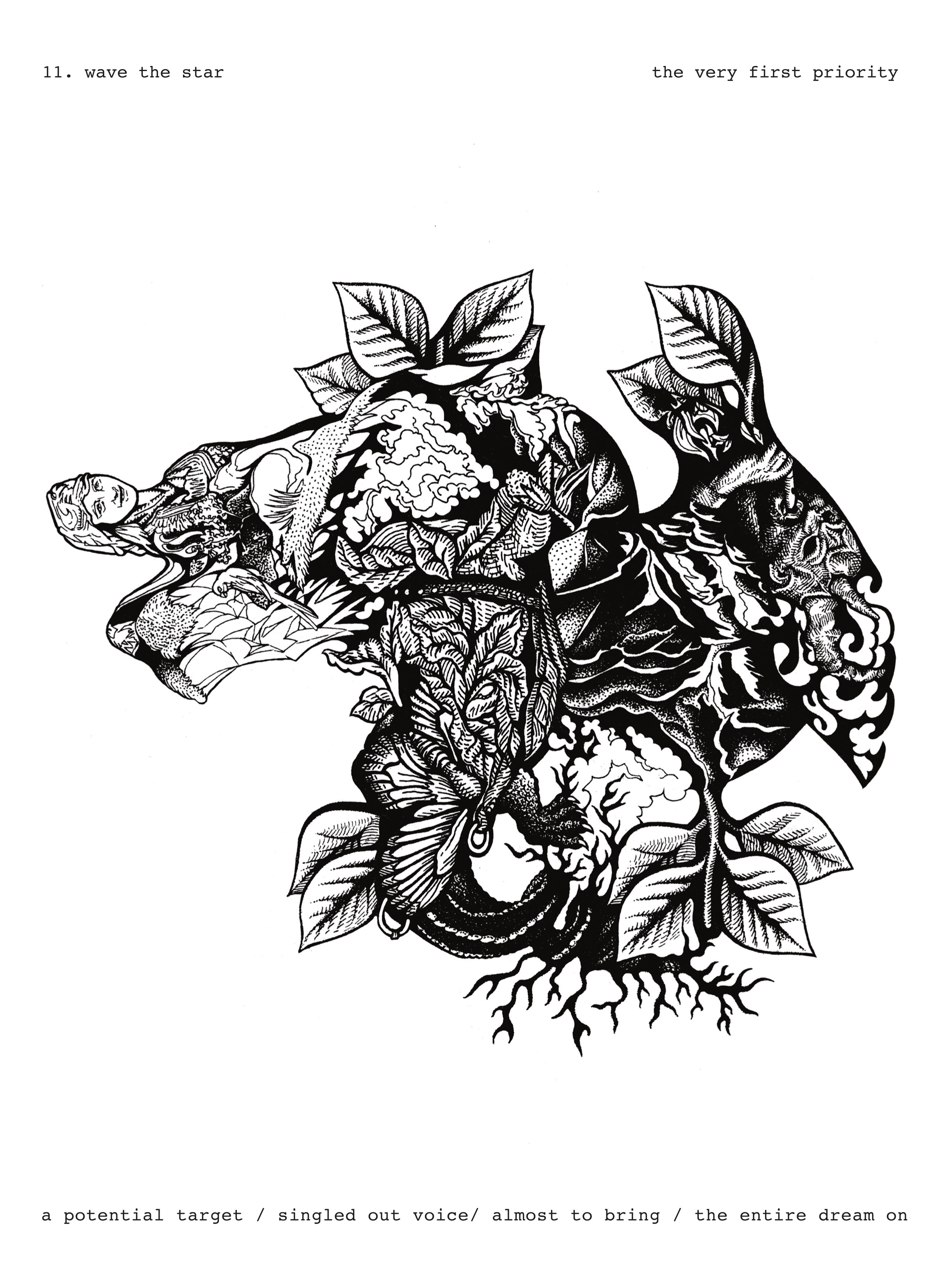


Turner Williams Jr. - Frontier Codec: Tome 1
First Edition Paperback
44 pages
Order
mazed in machinetime / a hayseed is reborn
embowered at last / a last green man returns
to find the oroborealtree of / life after lore
The first volume of an ongoing collage novel, in which Williams riffs on the human appetite for lore and vernacular data. He applies a hand-made, systems-based approach to storytelling that scrambles intricate drawings, cutups and fractured texts into a shuffling, scrolling yarn as iconographic as it is abstract. The book unfolds along the crease between folkloric allegory and the load-bearing jargon of our time. This is storytelling as a manipulation of signal flow. The image and the word, compressed, coded, converted.
"The images are very powerfully folded in on themselves then open out to a kind of overfull children’s book quality. A sort of naturalness in an obviously fictional context. Animal heads on elaborately clothed human shapes. The snakes. It’s not at all something to escape to. Like "Une Semaine de Bonté" I thought. Becoming more confidently itself, the story was already there and it’s a visual story but the texts are almost like “please don’t touch the pictures” very cold and kind of have a warning quality reminding you of fixed barriers which are themselves at the same time enigmatic and kind of like the tar in the tarbaby story." - Johnny Coley
Sweet Wreath Newsletter No. 26 Interview :
Wow, I'm still absorbing this...it's thick with symbols, signs and potential meaning. What in the hell was going through your mind? When and how did this begin?
Well, above all, collage is always on my mind. It’s just how I see and hear and function. Looking and listening all the time, discovering the hinge-points where things can overlap, merge or be juxtaposed. So much novelty just pouring out of one move. It all comes from the cutup, which everything in our culture and technology forces into our lives anyway. I’m just going with the flow really, and this book is one output.
But, more specifically, this book started with another book: a sprawling journal of many collages I started in Tuscaloosa about 10 years ago. That was the first step, but I became obsessed with re-drawing those collages and filtering them through my own brain/hand. Then I wanted to return the drawings to the process of collage so I made copies of those drawings and made collages with them, expanding that handful of drawings to 20 or 25 pieces which started to suggest something more story-like. At the same time, I had a kind of epic collage poem that was growing through a very similar process. Eventually, the two projects became one.
What were some of the sources you pulled from for images and text to collage with?
Illustrated kids bibles, landscaping supply catalogs, textbooks, an actor’s guide to
learning various southern accents...
Can you describe what you're thinking about with codecs vs. codex?
My father-in-law is a computer scientist, and, the more I learn about his work, the more
depth I discover in this tech jargon that kinda undergirds, like, everything we deal with now. Information compression is a big one and so are codecs. In programming, a codec both decodes and re-codes something, changing it from one format to another. Think of converting an mp3 into a WAV file. You need a codec for that. I’m also interested in medieval history and culture, and, in Europe, an early manuscript storing all kinds of data is called a codex. In French, the word “frontier” means “border”. This terminology and its meaning has been a real eye-opener for me.
How does machinetime fit into this process?
"Don’t quote me on this, but I’m pretty sure the term “machinetime” comes from studies
on addiction, particularly gambling addiction. It’s the trance state that one enters while indulging in whatever behavior, let’s say gambling at a slot machine. Winning or losing, the addict is suspended in a pure mindless action, which becomes the objective: reaching and sustaining this state of “machinetime.” I think something similar is playing out online. Dissociating through consuming, scrolling, shuffling... losing time... intentionally! I think people are addicted to data, narratives, stories... you know, lore. Vacuuming up pre-fab tales as an escape into fake history. What’s that lead to? Fake future?"
Any thoughts on the recurring hatted figure?
For a long time in European architecture, there was this funny practice of hiding
botanical-humanoid characters in the facades of buildings. They’re just hiding in the details, little leafy-faced freaks peering out. They’re called green men. There’s a whole pseudo- mythology around them in Europe. All kinds of theories, but, for me, the green man is an ode to nature, the force we try and ultimately will fail to contain. In my book, the green man is rebooting and rebranding. Repent!
What's next? you're touring, yeah?
I’m going on tour in the Northeastern US - 9 gigs with old and new friends. I play the
electric shahi baaja with a kind of home-brew polyphonic dub rig. I’ll also be doing some duos with Henry Birdsey from Tongue Depressor on pedal steel. We have a rural doom band called Trespass Field. I promote all of that via my IG account if you’re curious. Then I go back to France and play some more gigs before spending a few weeks in Japan, gigging and researching the origins of my instrument.
And you've started a label in Marseilles called Pylône Editions, what projects are in the works for that?
Like Sweet Wreath, Pylône Editions is my attempt to build a community in
Marseille. We’re releasing cassettes and zines exclusively (both still cheap to ship using France’s version of media mail). We’re still very modest but planning to release more artist books soon. Our big goals are to share deep sounds from the French underground and promote the incredible but rarely translated writings of Max Ernst.
First Edition Paperback
44 pages
Order
mazed in machinetime / a hayseed is reborn
embowered at last / a last green man returns
to find the oroborealtree of / life after lore
The first volume of an ongoing collage novel, in which Williams riffs on the human appetite for lore and vernacular data. He applies a hand-made, systems-based approach to storytelling that scrambles intricate drawings, cutups and fractured texts into a shuffling, scrolling yarn as iconographic as it is abstract. The book unfolds along the crease between folkloric allegory and the load-bearing jargon of our time. This is storytelling as a manipulation of signal flow. The image and the word, compressed, coded, converted.
"The images are very powerfully folded in on themselves then open out to a kind of overfull children’s book quality. A sort of naturalness in an obviously fictional context. Animal heads on elaborately clothed human shapes. The snakes. It’s not at all something to escape to. Like "Une Semaine de Bonté" I thought. Becoming more confidently itself, the story was already there and it’s a visual story but the texts are almost like “please don’t touch the pictures” very cold and kind of have a warning quality reminding you of fixed barriers which are themselves at the same time enigmatic and kind of like the tar in the tarbaby story." - Johnny Coley
Sweet Wreath Newsletter No. 26 Interview :
Wow, I'm still absorbing this...it's thick with symbols, signs and potential meaning. What in the hell was going through your mind? When and how did this begin?
Well, above all, collage is always on my mind. It’s just how I see and hear and function. Looking and listening all the time, discovering the hinge-points where things can overlap, merge or be juxtaposed. So much novelty just pouring out of one move. It all comes from the cutup, which everything in our culture and technology forces into our lives anyway. I’m just going with the flow really, and this book is one output.
But, more specifically, this book started with another book: a sprawling journal of many collages I started in Tuscaloosa about 10 years ago. That was the first step, but I became obsessed with re-drawing those collages and filtering them through my own brain/hand. Then I wanted to return the drawings to the process of collage so I made copies of those drawings and made collages with them, expanding that handful of drawings to 20 or 25 pieces which started to suggest something more story-like. At the same time, I had a kind of epic collage poem that was growing through a very similar process. Eventually, the two projects became one.
What were some of the sources you pulled from for images and text to collage with?
Illustrated kids bibles, landscaping supply catalogs, textbooks, an actor’s guide to
learning various southern accents...
Can you describe what you're thinking about with codecs vs. codex?
My father-in-law is a computer scientist, and, the more I learn about his work, the more
depth I discover in this tech jargon that kinda undergirds, like, everything we deal with now. Information compression is a big one and so are codecs. In programming, a codec both decodes and re-codes something, changing it from one format to another. Think of converting an mp3 into a WAV file. You need a codec for that. I’m also interested in medieval history and culture, and, in Europe, an early manuscript storing all kinds of data is called a codex. In French, the word “frontier” means “border”. This terminology and its meaning has been a real eye-opener for me.
How does machinetime fit into this process?
"Don’t quote me on this, but I’m pretty sure the term “machinetime” comes from studies
on addiction, particularly gambling addiction. It’s the trance state that one enters while indulging in whatever behavior, let’s say gambling at a slot machine. Winning or losing, the addict is suspended in a pure mindless action, which becomes the objective: reaching and sustaining this state of “machinetime.” I think something similar is playing out online. Dissociating through consuming, scrolling, shuffling... losing time... intentionally! I think people are addicted to data, narratives, stories... you know, lore. Vacuuming up pre-fab tales as an escape into fake history. What’s that lead to? Fake future?"
Any thoughts on the recurring hatted figure?
For a long time in European architecture, there was this funny practice of hiding
botanical-humanoid characters in the facades of buildings. They’re just hiding in the details, little leafy-faced freaks peering out. They’re called green men. There’s a whole pseudo- mythology around them in Europe. All kinds of theories, but, for me, the green man is an ode to nature, the force we try and ultimately will fail to contain. In my book, the green man is rebooting and rebranding. Repent!
What's next? you're touring, yeah?
I’m going on tour in the Northeastern US - 9 gigs with old and new friends. I play the
electric shahi baaja with a kind of home-brew polyphonic dub rig. I’ll also be doing some duos with Henry Birdsey from Tongue Depressor on pedal steel. We have a rural doom band called Trespass Field. I promote all of that via my IG account if you’re curious. Then I go back to France and play some more gigs before spending a few weeks in Japan, gigging and researching the origins of my instrument.
And you've started a label in Marseilles called Pylône Editions, what projects are in the works for that?
Like Sweet Wreath, Pylône Editions is my attempt to build a community in
Marseille. We’re releasing cassettes and zines exclusively (both still cheap to ship using France’s version of media mail). We’re still very modest but planning to release more artist books soon. Our big goals are to share deep sounds from the French underground and promote the incredible but rarely translated writings of Max Ernst.
__________________________________________________________________________________________
